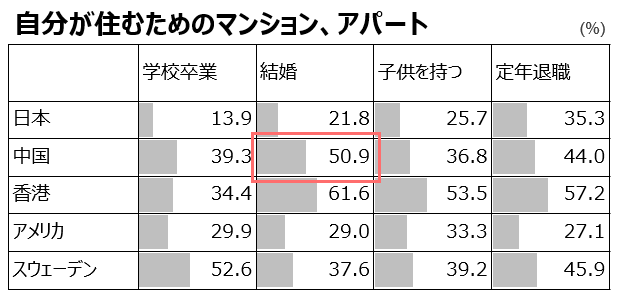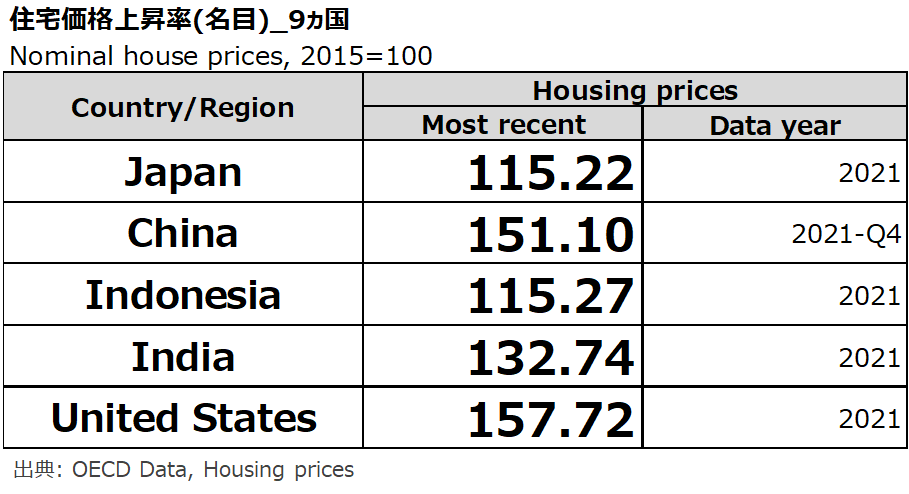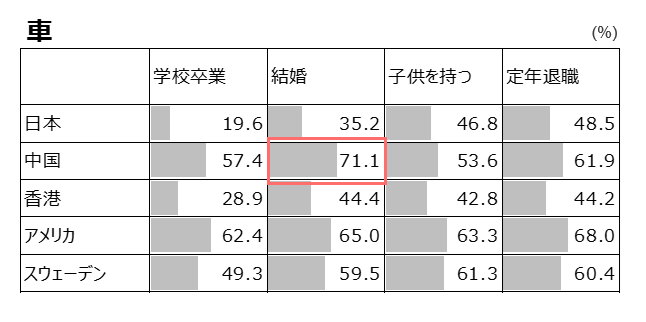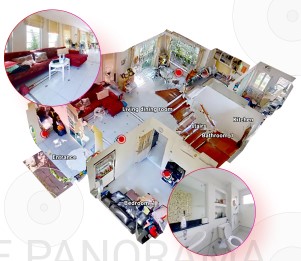【各国結婚と資産事情】中国編:結婚するときの準備
- 公開日:2022/08/01
- 更新日:2025/10/15
- 8604 Views

流行やライフスタイルが常に変化している中国。普段生活者と話していると、結婚観やジェンダーに関する考え方も数年前に比べて大きく変化していると感じる。上海での結婚事情・結婚するときに必要な準備について、2012年に結婚し上海市内で生活する張さん(38歳/女性/会社役員)の話を交えながらご紹介する。
結婚のタイミングで住宅を購入
居住地域や民族によって結婚事情が大きく異なる中国だが、上海や北京など都市部の生活者は結婚のタイミングで家を買うことが多いという。戸建ては一般的ではなく、マンションやアパートを購入する人がほとんどだ。

中国や香港では結婚のタイミングでマンションを買う人が多い
(設問文) Q7 以下の各ライフステージに向けて、あなたが持っておきたいものをそれぞれお選びください。 (1)学校を卒業し働き始めた時に持っておきたいもの (2)結婚した時に持っておきたいもの (3)第一子を迎える時に特に持っておきたいもの (4)定年退職・リタイヤした時に持っておきたいもの
出典:インテー ジ自主企画調査(9か国ライフイベントと資産に関する調査) URL:https://www.global-market-surfer.com/report/detail/152/

中国住宅価格は2015年から51.1%上昇している
そのことについて張さんは、「職場の部下に結婚を控えた90年代生まれが何人かいるのですが、話を聞くと意外や私の頃と変わっていない。みんな『買う』と言っています。買わない人?肌感覚ではありますが、全体の10%くらいではないでしょうか。『高くて買えない』という人は、地方の家を買う。私の知り合いに安徽省(あんきしょう)の女性と結婚した人がいますが、その人は比較的安価な、奥さんの実家近くに購入していました。100万元くらいだったと聞きます。いま実際に住んでいるのは上海の賃貸マンションだそうです。住むための購入ではなく、資産として購入しておくんです」。 結婚時にマンション・アパートを購入するという習慣は、今後もしばらくは続きそうだ。 購入資金に関しては人それぞれという面もあるが、上海では男性側の両親が出すのが一般的。頭金を男性側が出し、その後は双方でという例も多いという。また上海の新築マンションは内装を施さない状態で販売するため、別途設計・内装工事などの費用がかかる。 住宅購入時に重視することについても張さんに聞いてみた。 「住宅購入時に重視することはやっぱり『交通の便利さ』ですね。これから結婚する世代は、地下鉄で市内へ通勤できる郊外エリアを検討しているはず。ここ数年で新路線も何本か開通しているので選択肢は増えたと思います。もしくは多少古くて狭くても職場の近くを選ぶという人もいると思います。結婚したばかり=仕事を頑張らなければならない世代は職場へのアクセスが快適かどうかが重要です」。 そのほか、普段生活者の話を聞いていると「どちらかの親の家の近所に買った」という声もよく聞く。上海は、結婚・出産後も男性同様に出世し重役を任されたり、起業する女性が多い。子育てや家事に関しては両親のサポートが不可欠なのだろう。
車は「bba」、指輪はカルティエがステータス
住宅以外に準備するものといえば車だ。確かにまわりを見ても、卒業や就職などを機に車を購入したという人はいない。学生や若い世代向けのコンパクトカーは街でもまったく見かけない。教習所も学生時代ではなく車を購入した結婚後に通い始めるという人が多い。

結婚が車を購入するきっかけになっている
(設問文) Q7 以下の各ライフステージに向けて、あなたが持っておきたいものをそれぞれお選びください。 (1)学校を卒業し働き始めた時に持っておきたいもの (2)結婚した時に持っておきたいもの (3)第一子を迎える時に特に持っておきたいもの (4)定年退職・リタイヤした時に持っておきたいもの
出典:インテー ジ自主企画調査(9か国ライフイベントと資産に関する調査) URL:https://www.global-market-surfer.com/report/detail/152/
車に関して、昨年くらいから『bba』という言葉が流行っている。 BMW、ベンツ、アウディのことで、買うならこのどれかをまず検討する。その理由について張さんによると、「上海人は見栄っ張りが多いから(笑)。あとは、ブランドイメージ、アフターサービス、性能面などが信頼されているからだと思います。」 確かに上海市内の道路や駐車場を見渡すと、これらの車を非常によく見かける。「憧れ」ではなく実際に売れているのだ。『汽車之家』(自動車情報のポータルサイト)が2021年9月に発表した同年の1〜8月の販売台数ランキング(中〜高級車)では、3位に勢いを増す電気自動車ブランド「NIO」が入っている以外、上位をすべて「bba」が占めている。 https://chejiahao.autohome.com.cn/info/9542722/ 住宅や車の他に男性側は結納金を支払う。値段は人によるが、最低で10万元(約200万円) という。そのほか必須なのは婚約と結婚の指輪で、若い人ほど材質や値段よりもブランドで選ぶ人が多い傾向がある。人気があるのはカルティエ。8,000~15,000元(約16万~30万)くらいが相場。 金のアクセサリーや金塊については高齢者が買うイメージがある。張さん曰く、金塊は「人に見せられないから不人気」とのこと。一方の指輪や車は外でさりげなく自分のステータスを伝えることができる。 「見栄っ張りが多いからですよね(笑)。でも3歳の娘がいる私の友人は、毎年娘に10~20gずつ金を買っているそうです。彼女が結婚するときにまとめてプレゼントするのだそう。そうやってコツコツ資産を作っている人もいる。ですから結局は同じ上海人でも人それぞれだと思います。」 それら資産に関するものに加え、結婚式、ブライダル写真、新婚旅行などにも中国人は惜しみなくお金を使う。コロナ以降は、式や旅行に使えなかった資金を車や指輪に充てたという人も増えたようだ。いずれにしても中国人にとって結婚は、人生でいちばんお金を使うタイミングなのかもしれない。
Consumer Life Panoramaとは
世界18カ国1,000名以上の生活者のビジュアルデータを蓄積した、ウェブサイト型データベース。住環境を閲覧できる3Dモデルや、各生活者の保有アイテムを撮影した2Dデータが多く搭載されており、文字や数字だけでは把握しづらい海外生活者の理解に役立つ。
本コラムで引用したようなビジュアルデータを用いて、
・海外生活者の属性別の違いを比較する
・カテゴリーの使用実態をリアルに把握する
・ターゲット生活者のライフスタイル全体を理解する
等、「現地に行かない」ホームビジット調査として活用が可能。

-

執筆者プロフィール
TNCライフスタイル・リサーチャー
株式会社TNCが運営する、世界70ヵ国100地域600名に住む日本人女性のネットワーク「ライフスタイル・リサーチャー」が、数字では見えてこないトレンドや、生活者の生声を切り出します。その生情報を元に、企業の課題解決のための提案や商品企画を行っています。 https://www.tenace.co.jp/
担当者プロフィール:中国・上海在住約20年。移り変わる上海の生活者トレンドを長年ウォッチしています。ここぞというときに驚きの額の買い物をする上海人たち。普段節約している様子もないのに、毎回すごいなと思います。 -

編集者プロフィール
チュウ フォンタット
マレーシア人リサーチャーです。15年前から来日し、今も東京を拠点とし、東南アジアをはじめ海外のインサイトについて発信しています。
 Global Market Surfer
Global Market Surfer CLP
CLP


